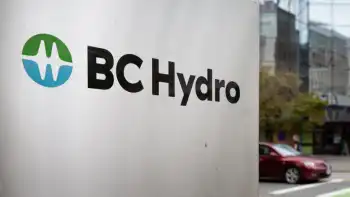Automakers roll out plug-in concepts
By Associated Press
Substation Relay Protection Training
Our customized live online or in‑person group training can be delivered to your staff at your location.

- Live Online
- 12 hours Instructor-led
- Group Training Available
Not to be outdone, GM announced production may begin as soon as 2010 on a plug-in hybrid electric version of the Saturn Vue Green Line, which it expects to be the first regular production plug-in hybrid electric vehicle.
And Toyota said it plans to test hundreds of plug-ins with fleet and commercial customers worldwide by the same year.
It's an electrifying race with many entrants, but one analyst says it's more of a public relations scramble right now for an industry that's lagged on drivers' demand and desires for alternative power.
"The automotive industry is trying to have this green image, but I don't see a true commitment... where a company is taking a leadership role," said Thilo Koslowski, an automotive analyst for Gartner Inc.
"The concepts trickling down are primarily based on consumers demanding them.... From the initial perspective, we see a lot of talk about concepts. It doesn't mean you can actually realize those... for the mass market."
Chrysler's entries in the concept race are Chrysler ecoVoyager, Dodge Zeo and Jeep Renegade. Officials say consumer demand isn't generated solely by technology. It also needs to come with distinctive designs — in other words, no one-size-fits all approach.
Frank Klegon, Chrysler's product development chief, said the Zeo concept, which is completely electric, is designed to maintain Dodge's tradition of performance. The ecoVoyager, coupled with a fuel cell, is meant to convey Chrysler's reputation as an "iconic American brand." And the Renegade, combined with a low-emission diesel engine, is envisioned as a vehicle that could "go anywhere" and "go green."
Still, he said, they are purely concepts with no production guarantees.
"With emerging technologies, you don't really know which one is going to be the right solution, or something else that leapfrogs in the meantime," he said. "That's one challenge for us as an industry and a company."
GM hopes to have the Volt on the market by 2010 but is setting no firm date. This year, it's showing a similar plug-in hybrid concept that's a collaboration between Saturn and Opel.
GM also will extend its hybrid lineup, releasing a new Saturn Vue two-mode hybrid, which is expected to boost fuel economy by about 50 percent when it hits showrooms later this year. And it predicts the Vue plug-in hybrid will be the first regular production vehicle of its kind.
Ford Motor Co. has a partnership with Southern California Edison to develop a small fleet of plug-in hybrids. The automaker delivered its first plug-in to the utility late last year.
"The intention there is for us to learn with them what are the opportunities for a workable business model for batteries of plug-in hybrids because there is still a significant cost associated with batteries," said Derrick Kuzak, Ford's head of global product development.
The auto show also features Toyota's plug-in hybrid prototype, which, like the current Prius, switches from pure electric to gas engine to a blended gas electric mode. But the plug-in has a second battery pack that allows it to store greater levels of electricity and is capable of operating in pure electric mode for longer periods of time and at much higher speeds.
Company officials said that when the plug-ins make it to showrooms depends a lot on their ability to mass produce the batteries and the usage by fleet and commercial customers.
Even upstarts are getting in on the act. California-based Fisker Automotive announced Monday it will begin producing a plug-in sports car in late 2009. The Fisker Karma will cost around $80,000, with projected sales of 15,000 per year.
Chinese automaker BYD, which is also one of the world's top battery suppliers, said it will begin selling a plug-in hybrid sedan in China by the end of this year and wants to bring the vehicle to North America in three to five years.
Many automakers say this time, the market is ready for electrics. The 1990s and early 2000s saw the rise and fall of GM's EV1 and offerings from Toyota and Audi.
Koslowski, who worked for Audi, said it's true that there wasn't as strong demand then. But he also blames the automakers for not promoting the technology or accepting lower profit margins in the short term as they boosted investment in batteries and other technology necessary to make it happen.
"Why didn't we do this before? The simple answer is nobody really forced the automakers to make these changes," he said. "The fact that we haven't had changes over the past couple of decades is shameful."
Troy Clarke, GM's North American president, said that GM fully understands the technological pitfalls of electric vehicles, such as the limited range of the batteries.
He said the technological timing is right, and comes at the convergence of three trends: concern over climate change, the need for U.S. energy independence and the high costs of oil.
"You don't really need anybody to convince you that this is the right time to start doubling down on your bets with this type of technology," he said.











